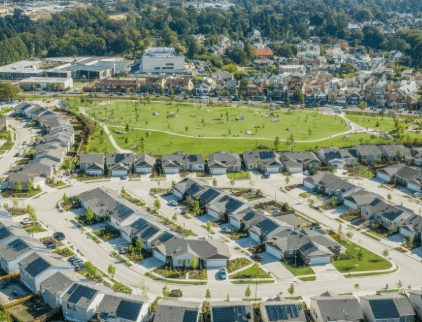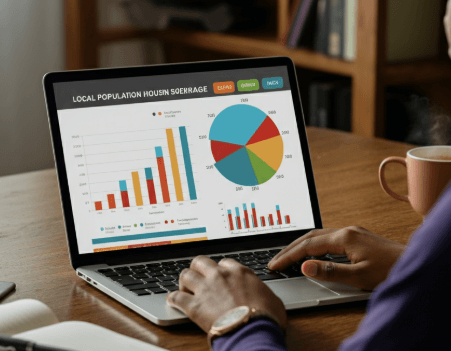Buying land for affordable housing can be a strategic step toward creating homes that meet pressing community needs. Did you know that land prices increased by 60% between 2012 and 2019, making affordable housing projects even more challenging to achieve? Land acquisition at the right price and location is critical, especially with rising costs posing a significant barrier. Steve Daria and Joleigh, esteemed real estate investors and cash land buyers, bring unparalleled expertise to guide individuals and organizations in making well-informed decisions within the industry. They can guide you through zoning regulations, identify surplus land opportunities, and help maximize land investments for affordable housing developments. With community land trusts increasing by 30% from 2011 to 2022, there is growing potential to create sustainable projects. For those serious about buying land for affordable housing, proper planning and expert advice can make all the difference. Book a free discussion with Steve Daria or Joleigh today to explore opportunities and unlock your project’s true potential!
Key Points
- Research Local Zoning and Land Use Rules: Check local zoning laws and land use regulations to confirm the property is suitable for affordable housing. Some areas don’t allow residential construction, so it’s important to understand these rules before buying.
- Assess the Land’s Location and Accessibility: Select land that’s conveniently located near transit, schools, and essential services. Accessibility to these amenities can increase the property’s value and make it more appealing to potential residents.
- Consider Land Costs and Your Budget: Rising land prices can be a challenge, so it’s vital to set a realistic budget. Look for surplus public land or discounted properties to lower costs and make your project more feasible.
- Hire Professionals for Inspections and Planning: Collaborate with professionals such as surveyors, appraisers, or architects to assess the land’s condition and potential. This ensures you can anticipate potential challenges and create a well-thought-out plan for the property.
- Partner with Experienced Real Estate Experts: Seek guidance from seasoned real estate investors like Steve Daria and Joleigh, who specialize in land buying for cash. Their expertise streamlines the buying process, helping you maximize the value of your investment.
What should I know before buying land for affordable housing?
Before buying land for affordable housing, there are important factors to consider.
Start by reviewing the local zoning laws to confirm that the land is appropriate for developing affordable housing.
When evaluating a piece of land, consider its location and proximity to key amenities like schools, hospitals, and public transportation.

These factors are essential in enhancing the property’s appeal and increasing its overall desirability.
You should also evaluate the cost of the land, including hidden expenses such as property taxes, permits, or utility connections.
Assessing the land’s environmental conditions is essential, as challenges like poor soil quality or flood risks can significantly drive up costs.
Engaging professionals like appraisers or surveyors ensures a precise evaluation of the land’s value and suitability.
Be sure to check local programs or government incentives that may help reduce costs or offer funding support for buying land for affordable housing.
Taking the time to gather all this information ensures you make a smart and effective investment.
Get Started: Get Your Cash Offer Below…
We are direct land buyers. There are no commissions or fees and no obligation whatsoever. Start below by sharing where your property is and where we can send your offer…
Are there specific areas ideal for affordable housing developments?
When it comes to affordable housing developments, certain areas are more suitable than others.
Locations near public transportation, schools, and healthcare facilities are highly preferred since they offer convenience to potential residents.
Urban areas with access to utility connections, such as water, electricity, and internet, can reduce setup costs and expedite development.
On the other hand, suburban or rural areas with lower land costs may also be attractive options for developers.
It’s important to consider zoning regulations, as some areas may restrict residential construction or require specific permits.
Additionally, land in regions known for affordable housing initiatives or government incentives can be a smart choice.
For anyone buying land for affordable housing, striking a balance between affordability and accessibility is crucial.
Choosing the right location ensures that the development meets both cost-effectiveness and community needs.
How do I evaluate if land is suitable for affordable housing?
- Check Zoning and Land Use Rules: Begin by researching the land’s zoning laws to confirm that they allow residential construction and affordable housing projects. If the land is not zoned correctly, you may need to apply for a zoning change, which can be time-consuming and costly.
- Evaluate Accessibility and Location: Consider how close the land is to essential services, such as public transportation, schools, and hospitals. Convenient access to these amenities enhances the property’s appeal, making it an ideal choice for affordable housing residents.
- Inspect Environmental Conditions: Examine the land for potential issues, such as flood risks, unstable soil, or contamination. These problems can increase construction costs or even make the project unfeasible, so it’s essential to conduct proper environmental assessments.
- Review Infrastructure Availability: Ensure that basic utilities, such as water, electricity, and sewage systems, are either readily available or easily installable. Lack of infrastructure can significantly increase costs and delay the development process.
- Analyze Market Demand: Assess the demand for affordable housing in the area by researching local population trends and housing shortages. Building in high-demand areas increases the likelihood of your project having a positive impact and achieving financial success.

What factors affect the cost of land for affordable housing?
Several factors can impact the cost of land for affordable housing.
Location is one of the biggest influences, as land near cities or areas with high demand often comes at a premium.
Zoning laws and regulations can also impact costs, as land that requires rezoning or additional permits may increase the expense.
Infrastructure availability, such as access to utilities and roads, is another key consideration since undeveloped land may require costly installations.
Environmental factors, such as flood risks or soil conditions, can increase costs due to the need for additional preparation or mitigation.
Market conditions, including the overall demand for land in the area, also play a significant role in pricing.
Government incentives or subsidies can help reduce costs, especially for projects focused on affordable housing.
For anyone buying land for affordable housing, it’s crucial to research these factors to find a cost-effective and suitable property.
Doing this groundwork upfront ensures a balanced budget and a successful project.
What documents are required to buy land for affordable housing?
- Title Deed: The title deed proves the seller owns the land and has the legal right to sell it. Without this document, disputes over ownership could arise, potentially putting your investment at risk.
- Land Survey Report: A land survey report outlines the precise boundaries, dimensions, and physical characteristics of the land. This is especially important to help confirm the property’s suitability for affordable housing projects.
- Zoning Certificate: The zoning certificate confirms that the land can be used for the type of development you’re planning, such as residential housing. This document ensures the land complies with local zoning laws.
- Environmental Assessment Report: This report identifies any environmental risks, such as flood zones or poor soil quality, that could affect the development. If you’re buying land for affordable housing, this step is crucial for avoiding costly surprises.
- Utility Access Documents: Utility access documents confirm whether the land is connected to essential services like water, electricity, and sewage systems, or if such connections can be established. Without proper access, projects may face higher costs and significant delays.
- Sale Agreement: The sale agreement details the terms of the land transaction, including the agreed price and any conditions of the sale. This binding legal agreement safeguards the rights and interests of both the buyer and seller.
- Tax Clearance Certificate: This certificate verifies that the previous owner has paid all taxes on the property. It’s vital to check this to avoid inheriting unpaid tax liabilities.
How long does it take to finalize a land purchase?
The time it takes to finalize a land purchase can vary depending on several factors, but the typical timeframe is between 30 to 90 days.
This period involves several critical steps, including verifying the title deed to ensure rightful ownership and conducting a land survey to confirm boundaries and property dimensions.
You’ll also need to check zoning laws to ensure the land is approved for your intended use, such as affordable housing.
If financing is involved, securing loan approval might add several weeks, especially if there are delays in documentation.
Legal processes, such as correcting title errors or preparing a sale agreement, can also impact the timeline.
For those buying land for affordable housing, careful planning and patience are essential to avoid unnecessary setbacks.
Collaborating with experts like real estate attorneys, surveyors, and appraisers can simplify and enhance every stage of the process.
To make your land-buying experience smoother and faster, start by consulting experts who can guide you and ensure nothing is overlooked.
Take action today to confidently start your affordable housing project!
**NOTICE: Please note that the content presented in this post is intended solely for informational and educational purposes. It should not be construed as legal or financial advice or relied upon as a replacement for consultation with a qualified attorney or CPA. For specific guidance on legal or financial matters, readers are encouraged to seek professional assistance from an attorney, CPA, or other appropriate professional regarding the subject matter.
